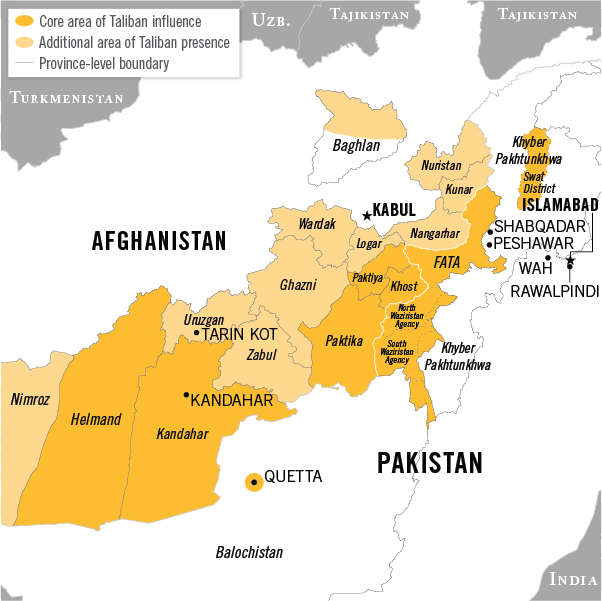TERRORIST GROUPS

BACKGROUND
The Taliban is a Sunni Islamist nationalist and pro-Pashtun movement founded in the early 1990s that ruled most of Afghanistan from 1996 until October 2001. The movement’s founding nucleus—the word “Taliban” is Pashto for “students”—was composed of peasant farmers and men studying Islam in Afghan and Pakistani madrasas, or religious schools. The Taliban found a foothold and consolidated their strength in southern Afghanistan.
By 1994, the Taliban had moved their way through the south, capturing several provinces from various armed factions who had been fighting a civil war after the Soviet-backed Afghan government fell in 1992. The Taliban’s first move was to institute a strict interpretation of Qur‘anic instruction and jurisprudence. In practice, this meant often merciless policies on the treatment of women, political opponents of any type, and religious minorities.

Tehrik-e Taliban Pakistan (TTP) is an alliance of militant networks formed in 2007 to unify opposition against the Pakistani military. TTP’s stated objectives are the expulsion of Islamabad’s influence in the Federally Administered Tribal Areas and neighboring Khyber Pakhtunkhwa Province in Pakistan, the implementation of a strict interpretation of sharia throughout Pakistan, and the expulsion of Coalition troops from Afghanistan. TTP leaders also publicly say that the group seeks to establish an Islamic caliphate in Pakistan that would require the overthrow of the Pakistani Government. TTP historically maintained close ties to senior al-Qa‘ida leaders, including al-Qa‘ida’s former head of operations for Pakistan.
Baitullah Mehsud, the first TTP leader, died on 5 August 2009, and his successor, Hakimullah Mehsud, died on 1 November 2013. TTP’s central shura in November 2013 appointed Mullah Fazlullah as the group’s overall leader. Fazlullah is staunchly anti-Western, anti-Islamabad, and advocates harsh tactics underscored by his ordering the November 2012 attempted assassination of education rights activist Malala Yousafzai. TTP since 2008 has repeatedly publicly threatened to attack the US homeland, and a TTP spokesman claimed responsibility for the failed vehicle-bomb attack in Times Square, New York City, on 1 May 2010. In June 2011, a spokesman vowed to attack the United States and Europe in revenge for the death of Usama Bin Ladin. A TTP leader in April 2012 endorsed external operations by the group and threatened attacks in the United Kingdom for its involvement in Afghanistan.



